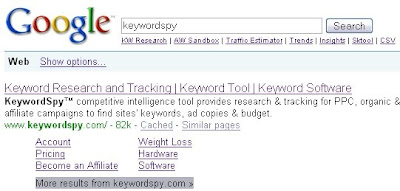The battle for visibility on search engines has become more intense, and it has become more important that people be discerning in the
keyword research and tracking tool that they use for their SEM, PPC and SEO campaigns. But how would you know which keyword tool to use?
Before we dive into the details of this discussion, let me stress how important it is to devote your self to a keyword research tool. Sure there might be keyword research tools that have the free trial option, and you could toy with it as long as time permits you, but if you really want to get the very gist of the function of the keyword tool and utilize it to the fullest in conjunction with your business, then you would have to subscribe.
Knowing that you have to shell out cash in order to bring in more cash, you should realize that in finding a keyword research and tracking tool, it is important that one considers the following criteria:
1. A user-friendly nature 
The starting page should already show where to do your keyword search. Aside from that, the information should be presented in an orderly manner. Graphics should not be too distracting, but also not too dull, in order to communicate the needed information well.
2. Comprehensiveness in information
Your limit on your
keyword tool should be a reasonable one. With thousand upon thousands of keywords on the Internet, your goal is to get each and every one of them. You should have a goal of at least 50,000 keywords to collect, and skim the cream of this already precious crop.
3. Distinguishability in information

This means that once a person gets on a keyword research site, they can search for any of the following when they go to the site: a keyword and its PPC profitability, a competitor’s domain, an affiliate which helps sell his product, and a product which he can take an interest in examining.
4. Relevant metrics

Doing
keyword research with having to go all over the search engines is like firing a misguided missile. The bottomline is, when doing your
keyword research, you need to consider the metrics or analytics that will put you at the top of the heap. Namely, your keyword ROI, cost per click, and click per day. Such numerical statistics could prevent you from always making a wild guess and actually pinpoint what your customers usually search for.
5. A detailed description of how your competitors’ ads go

Most likely, a
keyword research tool will give you the whole copy of the ad, from the title to the description down to the URL.
KeywordSpy utilizes this to a hilt, for example, as it has the Ad Variations sections tab for every SEM and PPC related category in the Keyword and Affiliate Research sections, which shows the ad next to the landing URL.
6. Frequent updates

Current information is needed for more accurate scouring of the SEM, PPC and SEO competition. And on the average, keyword tools will give you that on a per-week basis.
Monthly updating is also a reasonable time if it involves meticulous keyword research. Since websites, as a whole, tend to relaunch a campaign on a monthly basis, techniques are fully fleshed out only in such a period. Your keyword research tool would then pick up that information once the database is refreshed and give it to you instantly.
7. Affiliate search capability

It’s not only the product owners themselves who are involved in the selling of their merchandise or service, but also the affiliates who sign up with them. It would be to your advantage if your keyword research tool monitors the PPC activities of these affiliates. Moreover, affiliates also publish keyword ads of their own, and the ideal tool would make sure to pinpoint those and present it to the client.
8. Option to track the competition
 What would give your keyword research tool a great advantage is if it can, literally, follow every move of your SEM competitors. Your competitors can always pull out a surprising strategy against you, so you must know what to do in order as a counter-attack by way of tracking them—their changes in the use of keywords, ad copies, strategies and so forth. An example of such a site is KeywordSpy, whose revolutionary tracking feature helps you in accomplishing that.
What would give your keyword research tool a great advantage is if it can, literally, follow every move of your SEM competitors. Your competitors can always pull out a surprising strategy against you, so you must know what to do in order as a counter-attack by way of tracking them—their changes in the use of keywords, ad copies, strategies and so forth. An example of such a site is KeywordSpy, whose revolutionary tracking feature helps you in accomplishing that.
9. Ready support service

Some sites go as far as having chat support for them to better address their market’s concerns in real time. Support via email is also helpful, for a more detailed description of how the service goes, and in addressing one’s concerns regarding the site. But all in all, a support service represents the value the company gives to the customer.
So, knowing all of these things, you can now set about wisely for a
keyword research tool for your SEM, PPC and SEO research. And not just any
keyword research tool—but something that you will use continually and give you the best value for your money.





















































